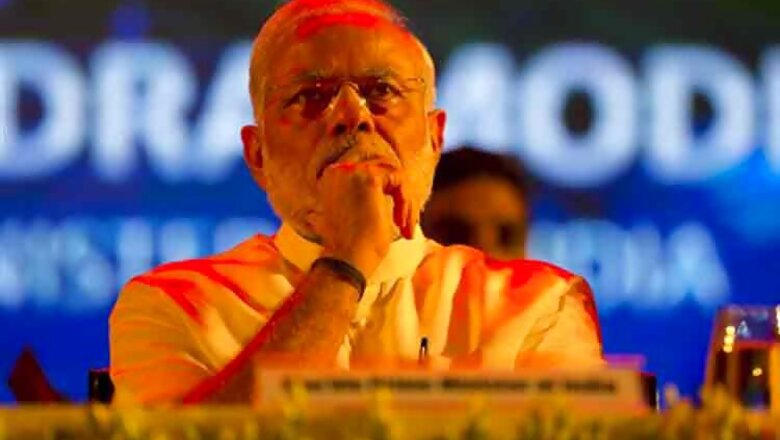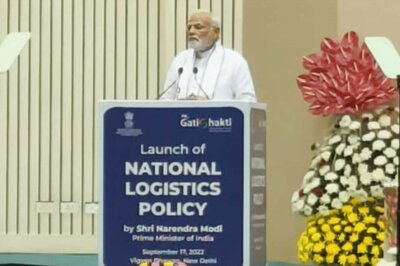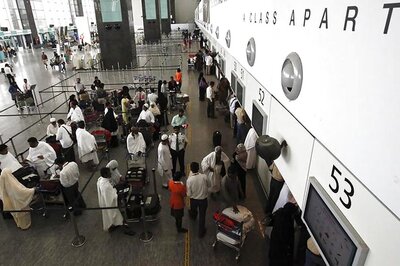
views
At the New York Townhall Q&A organised by Facebook, Narendra Modi said, “The people are now voting every 5 minutes, rather than every 5 years” with the advent of social media. For someone so acutely aware of the people’s changing moods, he has wasted a lot of time.
After just about 17 months in office, the Modi government is facing a huge backlash from an atmosphere of intolerance in the country, but Modi is immersed in Bihar elections, hoping that the results will go in BJP’s favour and the “manufactured rebellion” will simply go away.
But it is becoming increasingly clear that only Narendra Modi can save Narendra Modi’s government.
His desire to somehow win in Bihar is evident. Nitish Kumar said of Modi, “In his desperation to win Bihar, he is losing India.”
That’s only partially true. People in the rest of the country aren’t so much bothered whether the BJP wins in Bihar or not. BJP winning in Haryana and Jharkhand or putting up impressive performances in Maharashtra and Jammu & Kashmir after the Modi government came to power didn’t really matter to them either.
But the BJP losing Delhi election miserably did come as a surprise.
Objectively speaking, Narendra Modi’s biggest challenge is not Bihar. He is rapidly losing the nation’s goodwill and support by deliberately turning deaf and mute to the rising chorus of protests against the poison of intolerance.
Never before in the history have so many eminent writers, artistes, filmmakers and historians have come out in the open and protested against the shrinking of the liberal space.
They were proud of being conferred with national awards for their achievements. They are now returning the awards voluntarily because their conscience has been pricked and they can no longer remain silent. How else can they protest?
Eminent writer Nayanatara Sahgal, who, though being a close kin of Indira Gandhi, had stridently opposed the Emergency. She was the first to cast a stone by returning her national award given in 1968 to register her protest against intolerance.
Since then, the AwardWapsi has turned into an avalanche. Some of them may have been beneficiaries of the Congress regimes of the past and now feeling out of sorts after the BJP came to power. But that’s a miniscule minority. To dub all protestors as “Congress agents” is the height of stupidity.
When eminent scientist PM Bhargava, 87, decided to return his Padma Bhushan, the most articulate minister in the Modi Cabinet, Arun Jaitley let out his frustration: “Those returning their Padma and other national awards are rabid anti-BJP elements indulging in electioneering by other means.”
Jaitley, who had earlier termed the protest as a “manufactured rebellion,” once again came to the rescue of Narendra Modi on Sunday, claiming that “the prime minister himself had been the worst victim of ideological intolerance since 2002.” He also said that the Congress, the Left thinkers and activists had initiated a “structured and organised propaganda” so that the nation’s “growth story” was obstructed.
Jaitley is obviously obfuscating facts. Despite huge question marks over Modi’s role in the 2002 Gujarat riots, the nation gave him and the BJP an unprecedented mandate in May 2014 to rule the country. It was almost an act of “forgiving” and showing extreme tolerance, rather than intolerance.
Modi’s Swachch Bharat, Make in India, entrepreneurship development programme, expansion of banking for the poor and a few other initiatives have been applauded, though the achievements so far have been far short of the initial promise.
For someone who had little experience in international affairs, Modi has conducted himself with remarkable poise in dealing with world leaders and earned their praise.
His visits abroad have been well received and there is a clear perception among world business tycoons that investment climate has improved under Modi.
But his domestic policies have been a spectacular failure. The prices, including that of agricultural commodities have been rising, making life difficult for the common man. The profits are going into the pockets of hoarders and black marketers and the farmer suicides have reached tidal proportions.
The promised reforms, specially the introduction of GST, are nowhere in sight thanks to political mismanagement. The tall claims over recovery of the black money have become an embarrassment, which even the government doesn’t want to talk about.
Yet, the people of India were ready to give Narendra Modi a long rope and sufficient time to show results.
But the Hindutwa brigade, eager to push its agenda, has put Modi in the dock. Rather, exposed his limitations to deal with the Sangh Parivar, unlike a tall leader like Atal Behari Vajpayee.
If, Vajpayee during his five-year term, had put the lid firmly on the genie, under Narendra Modi, it has escaped from the bottle and causing havoc, with or without his approval.
The lynching of a Muslim man by a mob at Dadri, not far from Delhi, for allegedly possessing beef, shook the nation. Later it turned out, to the embarrassment of the BJP, that the meat found in his house was mutton and not beef.
However, it didn’t stop the most uncultured culture minister Mahesh Sharma, whose constituency includes Dadri, to describe the lynching as an “accident.” And, adding insult to injury, he said, “You must also consider that there was a 17-year-old daughter in that house. No one raised a finger on her.”
Mahesh Sharma, a first-time MP and minister, has been making one provocative statement after another, but instead of being sacked or at least pulled up, he has been rewarded with a large bungalow in Lutyen’s Delhi, which was till recently occupied by late President, Dr Abdul Kalam.
The 10, Rajaji Marg bungalow allotted to Sharma is a spacious 1094 sq meters structure on a sprawling 7,367 sq meters land, while senior leaders Arun Jaitley (727 sq m), Rajnath Singh (385 sq m) and Sushma Swaraj (322 sq m), all have much more modest bungalows.
Modi’s biggest blunder was not to condemn the Dadri killing immediately and unequivocally. He spoke about the incident a good 11 days later, calling it “sad and unfortunate.” He also tried to pass the blame on to the state government, saying that the Centre had nothing to do with it.
When the controversial BJP MP Sakshi Maharaj advocated death penalty for cow slaughter or the Haryana chief minister Manohar Lal Kattar asked Muslims to “quit eating beef or leave the country,” they were met with stoic silence from Modi, giving room for suspicion that either he tacitly supported such statements or was too scared of the backlash from the RSS if he initiated action against them.
Vajpayee’s umbilical cord with the RSS was no less strong than that of Modi, but very early in his prime ministerial tenure he drew the lines of “Raj Dharma” that he would follow and stuck to it against enormous odds to become one of the most successful prime ministers the country has seen.
With still three-and-a-half years to go to live up to the mandate given , Modi has little option but to put down the hotheads in the Sangh Parivar if he wants to make a meaningful contribution as prime minister. Silence, and sitting on the fence, will not save him or his government from being reduced to a lame duck one.
(Author Ramakrishna Upadhya is a Bengaluru based veteran journalist. He has earlier held senior editorial positions in Deccan Herald, Indian Express, Telegraph & ETV)



















Comments
0 comment